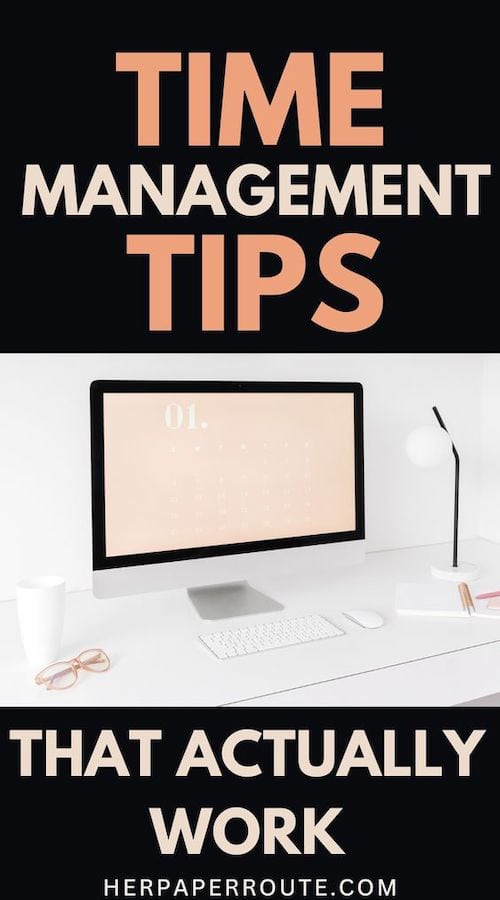20 Powerful Time-Management Tips That Actually Work

Want to never waste time again? looking for time-management tips that actually work?
Time is our most valuable asset, you can’t get more of it, and every single person on the planet has the same amount of it.
As an affiliate partner of various brands and sponsored content, HerPaperRoute may earn commission on qualifying purchases. Disclaimer
What you decide to do with your time is completely up to you, you may not feel like this is true, but it is 100%.
If I can guess correctly, the number one reason you’re reading this article right now is that you’re not making the most out of your time. You know it, and you’re probably kind of beating yourself up about it.
So, here are 20 powerful time-management tips that can completely change your life and allow you to get a lot more done in the same amount of time. Or at least get as focused as possible in order to accomplish your tasks.
How To Never Waste Time Again: 20 Powerful Time-Management Tips That Actually Work
1. Plan ahead of time.
One of the worst things you can do in the morning is to wake up and go around your day without a plan in mind. You’ll end up wandering around and not knowing or forgetting your most important tasks for the day or week.
“Failing to plan is planning to fail”
Benjamin Franklin
You can write your goals and your To-do list with a pen and a piece of paper, or on your phone. I have always preferred writing out my to-do list or thoughts on paper.
For whatever reason, they seem more “real” to me, which gives me a sense of urgency to be more productive. Maybe I’m just playing a cheap trick on my brain, but for whatever reason, it works!
So set aside 5-10 minutes the night before, or implement it into your morning routine to write down your To-do list and most important tasks for the day. This can set you up for a productive rest of your day!
2. Prioritize (The Eisenhower Matrix).
When you aren’t clear on your priorities and what they represent on your schedule, it can be very easy to take on too many commitments and tasks and become that very busy person.
So, the Eisenhower matrix helps you figure out what are your priorities by categorizing your task by Importance and Urgency, as seen below.
- Important and Urgent: Do these task right away
- Important but not urgent: Plan where you are going to do these tasks.
- Urgent but not important: Delegate or outsource them (if possible).
- Not urgent and not important: Eliminate them or set them aside to do them when you have free time.
Now that you know how to identify and prioritize the important tasks, it’s time for the next time-management tip on the list.
3. Focus On the most important tasks first.
The vast majority of people have the most amount of energy in the morning, so it’s wise to tackle the most challenging thing first, instead of doing it later in the day when you are tired.
Secondly, by finishing the most important task, you can use that feeling of accomplishment as a motivator to finish the other tasks you have for the day.
4. set a time limit for each task.
Setting a time limit for each time can help you be more focused on the chosen task, more motivated to finish it on time, and can prevent you from being distracted or procrastinating.
For me, it usually takes 3-4 hours to write an article for my blog (I’m getting better by time) so, if I start at 10 am, I want to finish writing at 2 pm.
5. Take a break between tasks.
The truth is: Humans are not wired to concentrate for 8+ hours on end.
So, it’s no surprise that (on average) in an 8-hour workday, people are productive for approximately 90 minutes.
After that, it becomes much more energy-draining to concentrate and work.
It’s important to take breaks, because of what happens if you DON’T do so: Your productivity goes downhill… FAST.
Move around on your breaks.
That may be yoga, stretching, going for a quick walk, or whatever you feel like doing.
Not only you’re actively relaxing your mind from work, but you’re also relaxing your body and muscles from sitting on a chair ALL day long.
6. Avoid and limit distractions.
Text messages, Instagram, Facebook, YouTube notifications, emails, and phone calls, just to name a few.
There is a study claiming that employees lose over 759 hours every year due to these distractions.
It’s so easy to get distracted when your phone is lighting up constantly, and it’s easier to get lost to the never-ending Instagram feed.
When I’m working, I put my phone in airplane mode. I’ve also turned off Instagram and Youtube notifications over a year ago as I found that I was on these platforms for over 3-4 hours respectively.
I’ve seen a tremendous boost to my productivity, and also to my overall happiness and mental clarity.
7. set boundaries.
People can waste your time. No need to be available 24/7 for everyone. That goes for family and friends too. Priorities. It’s okay to set some boundaries.
Extra tip: Wear headphones with a noise-canceling feature. Most headphones now have this feature and can be a life-changer.
If you wear headphones, there is a lower chance of someone interrupting you. Also, try and listen to binaural beats when you study or work. You can search it on Spotify or Youtube.
They’re instrumental beats with sounds of nature, designed to keep you focused on your tasks, achieving the “flow” state more easily. Win-win situation right there.
8. Use the Pomodoro Technique.
The Pomodoro Technique is basically the tip #5 #6 #7 and #20 combined all in one.
The Pomodoro Technique is a productivity method created by Francesco Cirillo in the 1980s while he was a university student. He named this technique the Pomodoro Technique because each Pomodoro represents a time interval.
Essentially, in its original form, you’re focusing on the chosen task (and only that, no messages, emails, or multi-tasking in general) for 25 minutes, and then you take a 5-minute break. After the 4th time, you take a longer break, usually a 15-minute one.
Example of the Pomodoro Technique:
- 1st interval: 25 minutes of work, 5 minutes break,
- 2nd interval: 25 minutes of work, 5 minutes break,
- 3rd interval: 25 minutes of work, 5 minutes break,
- 4th interval: 25 minutes of work, 15 minutes of break
The great thing about this is that you can change the minutes of work and break to your personal needs.
If your task requires a lot of memorization, you can have 15 minutes of work. But if your task is answering emails or something else that doesn’t require huge amounts of brain energy, then you can do 50 minutes of work.
It’s totally up to you!
9. have a clock visibly placed in front of you.
If you are going to give the Pomodoro Technique a try, or if not, you can still try this, a great tip to 2x your productivity and your focus when you are doing the intervals is to have a clock visibly placed in front of you.
Sometimes we can get distracted by something or get stuck in our own thoughts, and we lose track of time.
Having a huge clock, or the timer of your phone, in front of you will keep you aware of the time at the moment.
By seeing the time counting down, you are more likely to get more things done in the same amount of time. It works as a motivator and as a deadline.
10. Know Or Create Your Deadlines.
Let me ask you some questions.
When people are the most productive? The day before a vacation.
Why?
Because they have to get things done before leaving for a week or two. When are people usually the best at studying?
The night before an exam. When are people usually getting the most stuff done for a project? The day before is due.
Your brain works better when you have a deadline because it goes like this: “I have to get this done because I have no other option”.
So, when do you need to finish your tasks? Mark the deadlines out clearly in your calendar, so you know when you need to finish them.
11. Set goals the right way.
Most of us, and I’m guilty of this too, set goals the wrong way.
Look back to your New Year’s Resolutions goals of the past years and you can see what I mean.
The correct way to set goals is by using the SMART method. That is, you want to create goals that fall under one or more of these categories:
Specific, Measurable, Attainable, Relevant and Time-Based
12. Batch your tasks effectively.
If you have phone calls and emails to send/answer, don’t do it throughout the day.
Set aside an hour or two later that day, so you can entirely focus on doing these two things.
The reason? Different tasks demand different types of thinking and energy consumption.
By batching related tasks together, your brain isn’t switching gears – which means you cut out that time re-focusing, saving you extra valuable minutes of frustration.
13. Declutter your workspace.
I always say: A cluttered workspace leads to a cluttered mind. And a cluttered mind leads to less focus and more distractions.
No matter if you work in an office or from home, you most likely have your own workspace.
Make sure everything it’s organized, so you don’t lose time trying to find things or have junk that can easily distract you from your task.
Extra tip: Try to clean up your workspace when you finish the tasks of the day, so you don’t have to do it the next day. This is only going to take you 2-5 minutes after your work but can save you a lot of focus and productivity in the morning.
14. Learn how to deal with stress.
Having too many things going on or too much work to handle can be very stressful.
When we are stressed out, our bodies release cortisol, the stress hormone, which can make it extra hard for us to concentrate on the things we have to do.
Learning how to deal with stress in a healthy way is an essential (but not mentioned enough) skill we have to learn, in order to be more productive with the time we have on our hands.
15. Delegate/ Outsource your tasks.
Delegation and outsourcing can get a bit tricky. For some, it’s hard to let someone else do the work that they used to do.
For others, they don’t have the time to train someone else to complete certain tasks.
But, if there are things that can be better done by others or things that are not so important, consider delegating.
This takes a load off and you can focus on the important tasks.
When you delegate some of your work, you free up your time and achieve more.
16. Wake up earlier.
There are only 24 hours every day. Although you can’t make more time, you can try and wake up a bit earlier each day.
Consider changing your evening routine, or cutting of the time of TV and/or scrolling through Instagram, so you can go earlier in bed.
Don’t forget that, to properly function you need 6-8 hours of sleep, but it can vary.
Here’s what I do to wake up at 5am.
17. Meditate And/Or Exercise Every Morning.
Waking just 30 minutes earlier every morning, you get an additional 182.5 hours extra time each year.
You can use this additional time to meditate, exercise, read a book, pursue a hobby, or get things done without being in a hurry.
I’m specifically focusing on meditation and exercise because meditating can help you achieve more mental clarity and exercise boosts your energy.
This means that you don’t have thoughts running in your brain, distracting you from your tasks, and you also have the physical and mental energy to start and actually finish your work.
18. Find Inspiration.
There are days that we feel overly productive and accomplish a few days of work in just a few hours, but there are also days when nothing is clicking right.
We feel unmotivated, not wanting to do anything, and get easily distracted by every little thing that comes into our mind.
Or worse, we get drowned in our negative thoughts.
What I like to do when I’m in a similar situation is to either listen to my favorite audiobook, get some happy and uplifting music playing on, or watch motivational videos on YouTube to put me in the right mindset to work.
What is your inspiration? What do you do when you feel unmotivated? Let me know in the comments below.
19. No Multi-Tasking.
Research shows that only 2% of people can multitask effectively. Big surprise, huh?
So, instead of dividing your attention into 5 different things at the same time, which makes you less productive overall, because your focus is all over the place, try and have your full concentration into one task, and one task only.
20. Track Your Task Time.
Track your time spent doing work and tasks on a calendar or notebook. You can use physical ones, but in my case, I prefer physically writing down stuff.
This tip is useful to understand where you put your time into.
You may be thinking that you’re answering emails for 30 minutes but you’re actually doing it for 1 and a half hours.

Follow along on Instagram!











